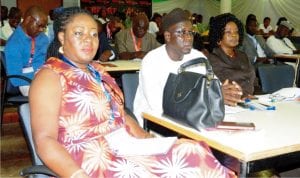Business
CBN Targets Higher Lending Rates

Participants at the Airport Business Summit and Expo in Abuja, recently.
The Central Bank of Nige
ria (CBN) has projected that lending rates would go up in the coming months as domestic and international headwinds continue to undermine efforts aimed at keeping the nation’s inflation rate at single digit level.
The CBN Governor, Mr Godwin Emefrele, made this known during an interview with journalists at the ongoing world Bank/International Monetary Fund (MF), spring meetings in Washington.
Emefiele, stated that the situation where the inflation rate was higher than the Monetary Policy Rate, (MPR) or benchmark lending rate, was not an acceptable model.
The Nigerian apex bank boss, pointed out that despite the current domestic and global fiscal headwinds affecting the economy negatively, the CBN world continue to do everything reasonable to stimulate broad-based growth of the economy through innovative monetary policy measures.
He said, CBN would focus its monetary support measures on critical sectors such as agriculture and mining that have the potential of boosting domestic production and by implication, help in the efforts to sustain macroeconomic stability and inclusive growth.
He added that the present shocks being experienced by oil exporting countries could be averted through the diversification of the economies and described the drive by the government to diversify the economic base as a step in the right direction.
“Practically, all are facing the challenges and everybody is looking at the possibility of diversifying their economies from being over-reliant on oil. So, obviously we are on the right course, but the challenges are still there not just for Nigeria but for different countries in the world”, he said.
Furthermore, he said”, what is important is that I reemphasise that we are on the right course by saying we need to continue to diversify our economy and I think for Nigeria, I see light at the end of the tunnel because we have a couple of Nigerian investors that have embraced the diversification of the Nigerian economy”.
On the increase in inflation rate, he said, “truly, Nigerians expect that if they want to access fund they should do so at a low interest rate but, of course, you will agree with me that with the increase in inflation rate from about 11.3 per cent that it was in February to almost about 12.4 per cent in March, naturally what you find is that interest rate will still have to go up sort of because when you have the MPR below inflation rate it is not a model that is acceptable. Interest rate has to be higher than inflation rate. So, that is what we expect”.
Transport
Automated Points Concession : FAAN Workers Gave 72hrs To Revise Decisions In PH

Transport
FAAN Announces Pick-Up Points for Go-Cashless Cards

Business
Fidelity Bank To Empower Women With Sustainable Entrepreneurship Skills, HAP2.0
-
Politics3 days ago
2027: NIGERIANS FAULT INEC ON DIGITAL MEMBERSHIP REGISTER DIRECTIVE
-

 Environment3 days ago
Environment3 days agoLAWMA Director Says Sweeping Reforms Have Improved Waste Collection
-
Politics3 days ago
LP Crisis: Ex-NWC Member Dumps Dumps Abure Faction
-

 Politics3 days ago
Politics3 days agoUmahi Dismisses Allegations On Social Media, Insists On Projects Delivery
-

 Sports3 days ago
Sports3 days agoAbia Not Sure To Secure continental Ticket
-
Sports3 days ago
La Liga: Yamal Records First Career Hat-trick
-

 Sports3 days ago
Sports3 days agoCity Survive Leeds’ Challenge At Elland Road
-
Politics3 days ago
NATASHA ELECTRIC VEHICLES INITIATIVE IN KOGI CENTRAL

